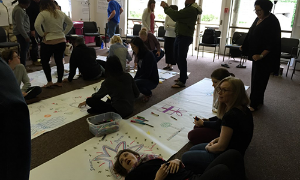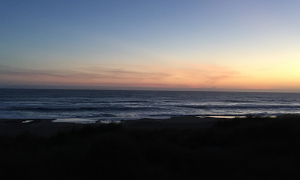The Powerful Story of You, Transformed
Maegan Scott, MSOD '17
If you are anything like me, then it might have taken you several years of exploration (let’s call it a decade) to figure out what you wanted to do after obtaining your undergraduate degree. And if we share more similarities, it probably took you less than 15 minutes to know, in your gut, that MSOD was the right path for you after reading the program description on Pepperdine’s website. It is a common narrative for many of my fellow cohort-mates in Sigma Prime, and, I believe, for many throughout the MSOD program as well. This is exactly the program everyone is searching for and never knew existed. Almost like the fairy godmother who appears when you least expect, but at the exact moment when you are ready to be transformed by a little magic.

Before I arrived at Pajaro Dunes—the storied retreat center for Intensive 1—I already felt as though I was on the precipice of transformation, in both my personal life and professional journey. I was ready to be more present with myself and with others. I was committed to strengthening my voice as a leader, and eager to sharpen my point of view as an organization development professional. In essence, I was looking to amplify “how I showed up.” My decision to study OD was a new North Star to guide me.
Transformation (n): 1. a metamorphosis during the lifecycle of an animal; 2. a thorough or dramatic change in form or appearance
Intensive 1 is the official launch of the MSOD metamorphosis. During this session at Pajaro Dunes, we had to get personal—up close and personal with our own narratives and life stories. Aristotle is rumored to have said, “Knowing yourself is the beginning of all wisdom.” This isn’t meant to be egoistic, even though at first blush it seems to be. No, mindfulness experts and personal effectiveness gurus—and our instructors for Intensive 1—Terri Egan and Suzanne Lahl guided us through a host of processes and practices to help each of us in the cohort understand how our past experiences influence our present-day decisions and actions. We examined our patterns and habits, unearthed some of our biases—all in an effort to increase our self-awareness and train our brains for creative and big picture thinking.
“Do you know what supports your greatness?” they asked.
 The narrative practice at Pajaro Dunes yielded some of the most difficult, rewarding,
illuminating self-work—practical work with existential benefits—I have done in years.
Why is this work important to an emerging OD practitioner (or, really, any human being)?
To be an agent of change, to use oneself as an “instrument” of change, one needs to
have clarity on their strengths, baggage, and blind spots; on what makes them uniquely
powerful. I believe this work is important because of how it supports a centering
value for OD: to be of service. We do this work so we can best be of service.
The narrative practice at Pajaro Dunes yielded some of the most difficult, rewarding,
illuminating self-work—practical work with existential benefits—I have done in years.
Why is this work important to an emerging OD practitioner (or, really, any human being)?
To be an agent of change, to use oneself as an “instrument” of change, one needs to
have clarity on their strengths, baggage, and blind spots; on what makes them uniquely
powerful. I believe this work is important because of how it supports a centering
value for OD: to be of service. We do this work so we can best be of service.
Terri Egan and Suzanne Lahl put a slight twist on Aristotle’s quote: “Know your story, shape your future.” I didn’t leave Pajaro Dunes with fancy glass slippers (I’d meant to check the Lost and Found before I left, but alas). But, I did leave with a greater understanding of my own story and inner treasure, which gives me power to shape my future. And that gift of ongoing awareness, learning, and transformation is a kind of magic in its own right.